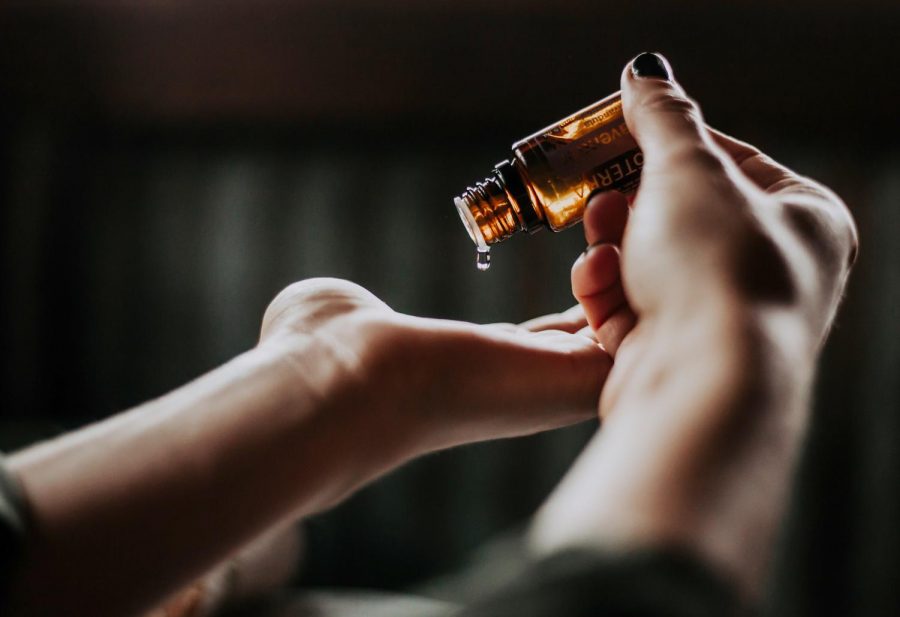Aromatherapy grows in popularity, uses
Diffused oils made from plant material can help ease physical discomfort, help emotionally, spiritually
SAM’s Apothecary owner Kraig Brown emphasized the importance of using and diffusing pure plant essential oils.
March 21, 2018
The recent popularity of essential oils has landed a wide variety on the shelves of many common drug stores, but it’s important to read up before using aromatic products.
Most are made of plant material, though citrus oils use the cold-pressed rind of fruit. This material is first heated, a process that opens the oil sacs in the plants. Most oils at this stage are placed into a condenser and separator, which isolates the plants’ oils from the water.
Essential oils are not evaluated by the FDA and are not meant to treat, diagnose or cure any disease or disease progression. Anyone interested in essential oils should consult a doctor before using, and SAM’s Apothecary owner Kraig Brown said people should make sure they purchase pure oils.
“It’s super important to go to a place [with] pure essential oils that either you can get test results from or you know the distiller,” he said, “because … you want to make sure they’re actually helping.”
Essential Oil Analysis Foundation is a group that produces test results for different brands of essential oils. The Essential Oil Test Reports revealed that many oils are heavily adulterated — with some not containing any real plant material — yet they were labeled as pure.
Brown rebottles oils from Plant Therapy in Twin Falls, Idaho with his label to carry them at SAM’s Apothecary.
After it is inhaled, an oil can promote calm and comfort, and help support respiratory health and emotional stability. Brown said there are many ways to achieve the desired results with an oil, from diffusion and inhalation to using it internally and topically.
Though oils can be ingested, Brown said this should be done under the care of a trained aroma therapist to ensure the oil is being taken safely.
Oils can also be applied directly on the skin over an area of physical discomfort.
For psychological, emotional or spiritual purposes, Brown said inhalation is best. Inhalation methods include diffuser necklaces or bracelets, a few drops on a cotton ball or an inhaler.
Inhaling the oils allows them to register in the olfactory system, which includes senses connected with emotions, like scent and taste. Brown said this could be why people find success with essential oils, especially emotionally.
However, Brown emphasized that adults should not be around oil diffusers for longer than an hour without a break, and that it’s important the diffusers don’t remain on all day or night.
Brown said people should keep track of the amount of essential oil used while diffusing. For regular use, he recommended no more than a 1-2-percent dilution. Brown said this is about three drops in 10 milliliters of water. For use in a roller ball, oils should have the same dilution.
For roller balls, the oils should be diluted with a vegetable oil. Brown recommended jojoba oil, sweet almond oil, argon oil, grapeseed oil or fractionated coconut oil.
If an individual is only using an essential oil for an acute or short-term problem without plans to continue after the area is treated, a 5-percent dilution is recommended. This is equivalent to 15 drops in a 10-milliliter bottle of chosen solvent.
Brown said any oils above a 5-percent dilution become overwhelming for our sensory system and are essentially useless.
There are a wide variety of uses for oils. Oregano, clove and thyme all contain a benzene ring in their chemical makeup that makes them effective at reducing airborne bacteria. Because of these oils’ high concentrations, Brown said to be cautious.
A few oils Brown recommended to ease discomfort are balsam, black pepper and clove. He said these contain a chemical that interacts with the immune system to minimize pain.
Citrus oils and their constituents are one of the main ingredients in cleaning products used for grease and hard-to-remove substances.
Before purchasing an essential oil, Brown advised looking at the bottle to make sure it states the name of the oil as well as the Latin name of the plant. For example, lavender has two strands that can have profoundly different effects. One is a relaxant, while the other could serve as a stimulant.
To get the most out of essential oils, Brown said to make sure they are stored in a cool, dark place. Since the chemical composition of essential oils changes over time, this will ensure they stay safe to use.
“It’s important for everyone to do their own research and have their own knowledge, and to trust their intuition,” Brown said, “and essential oils can definitely aid with that.”









